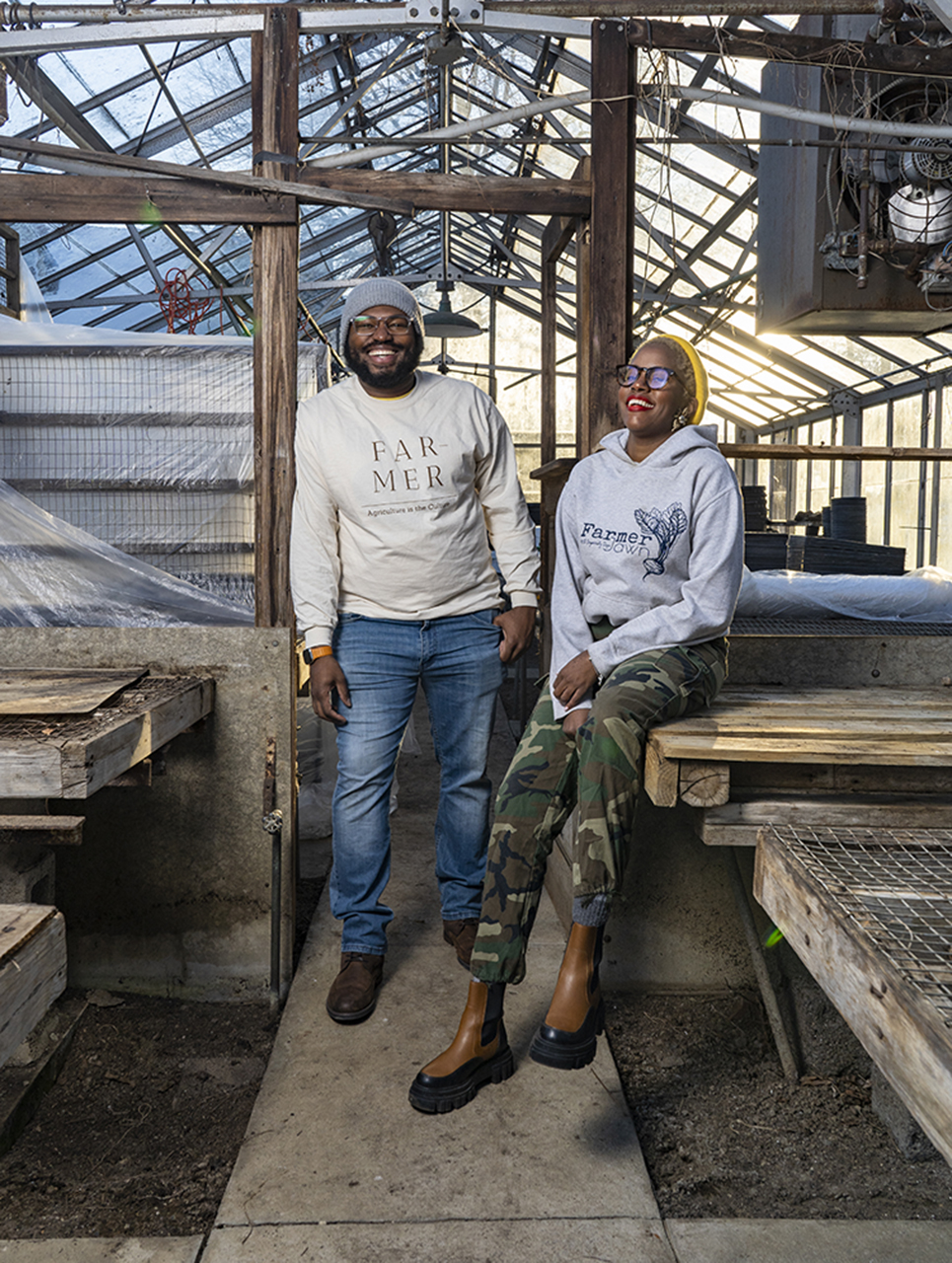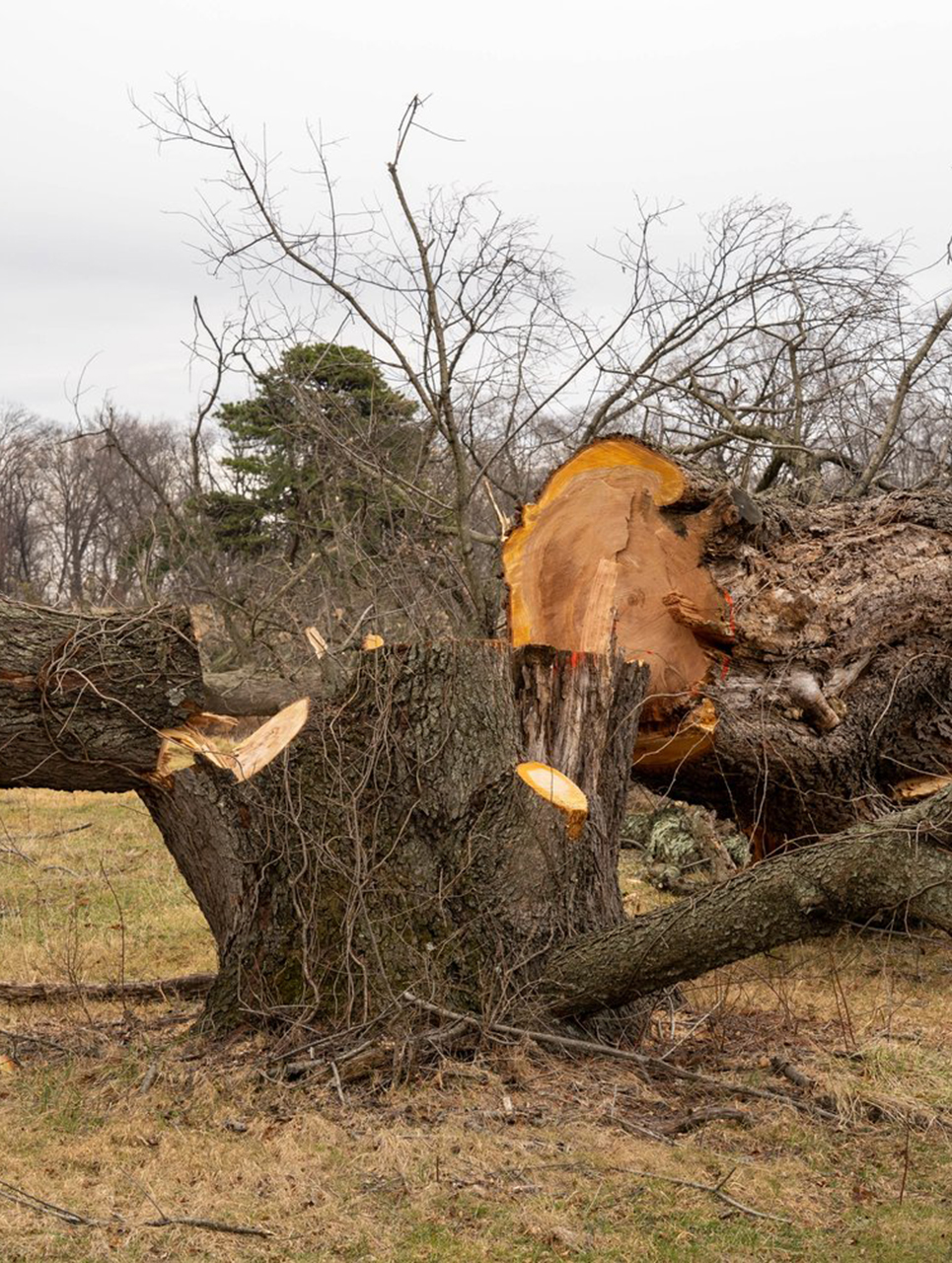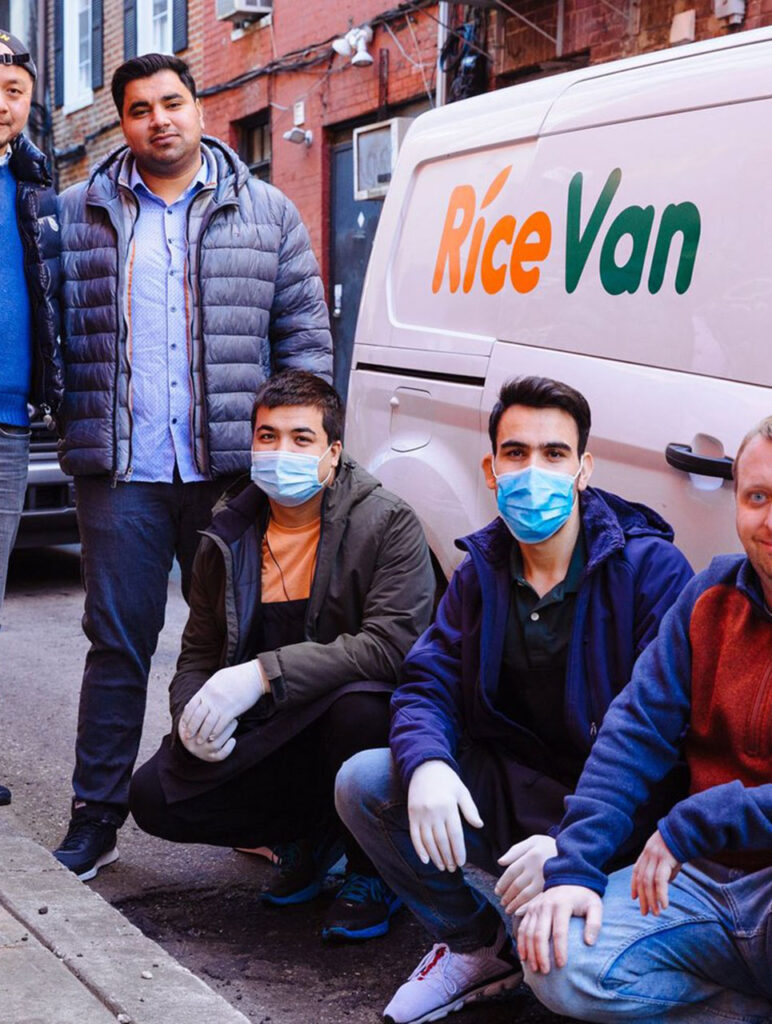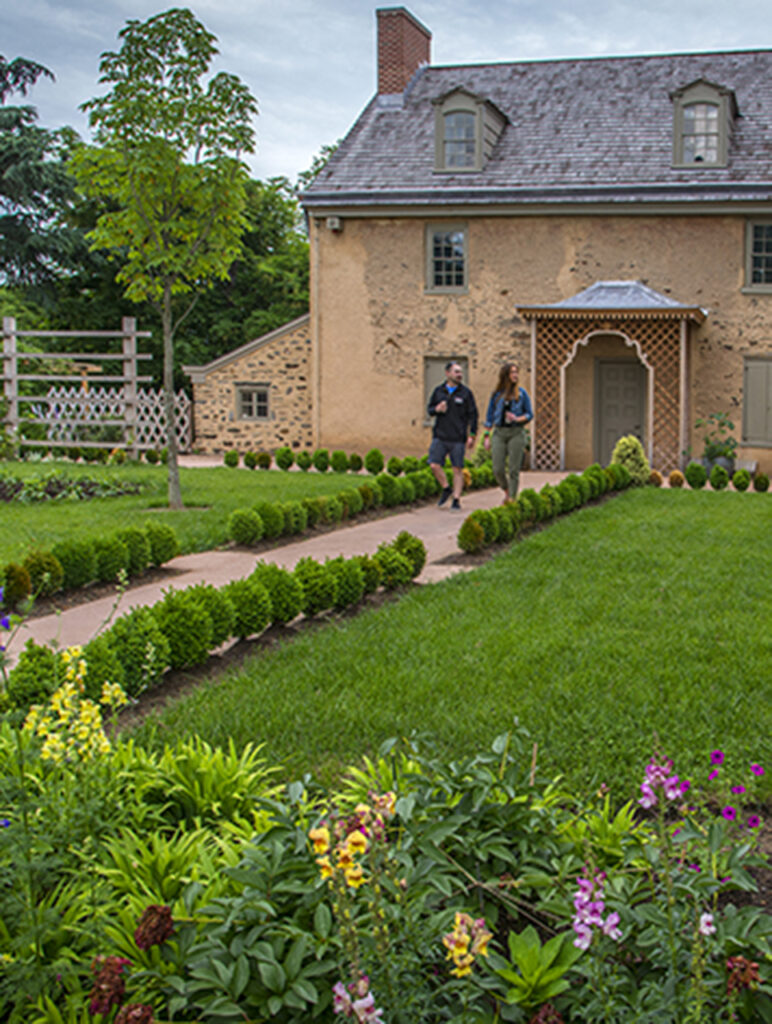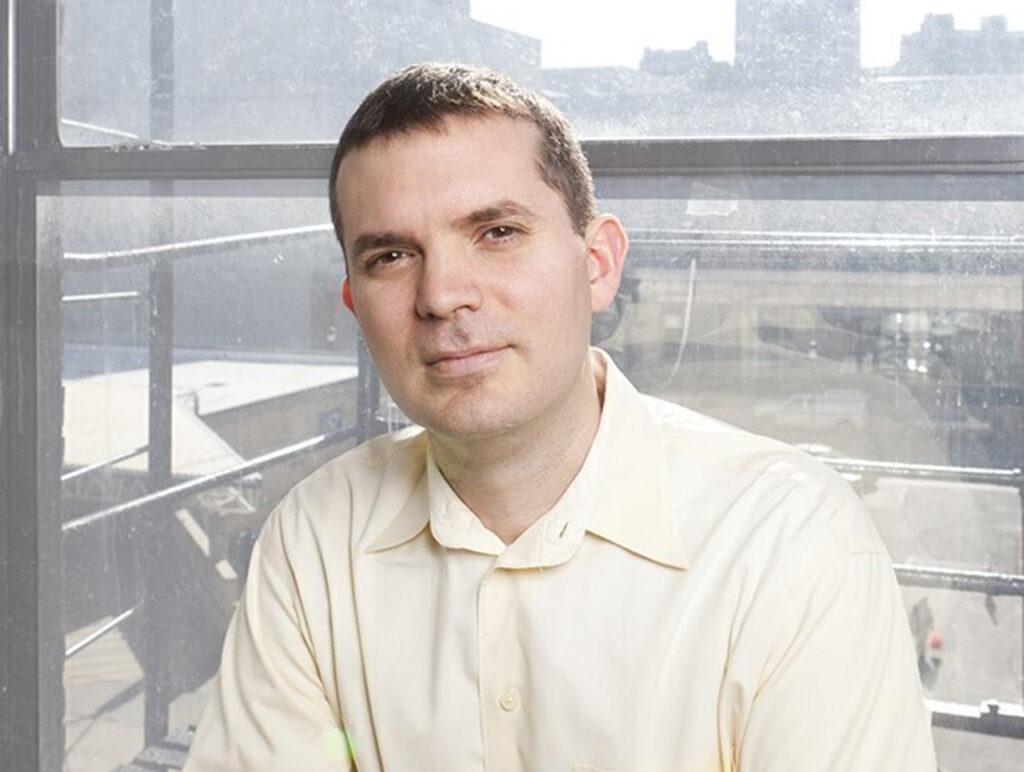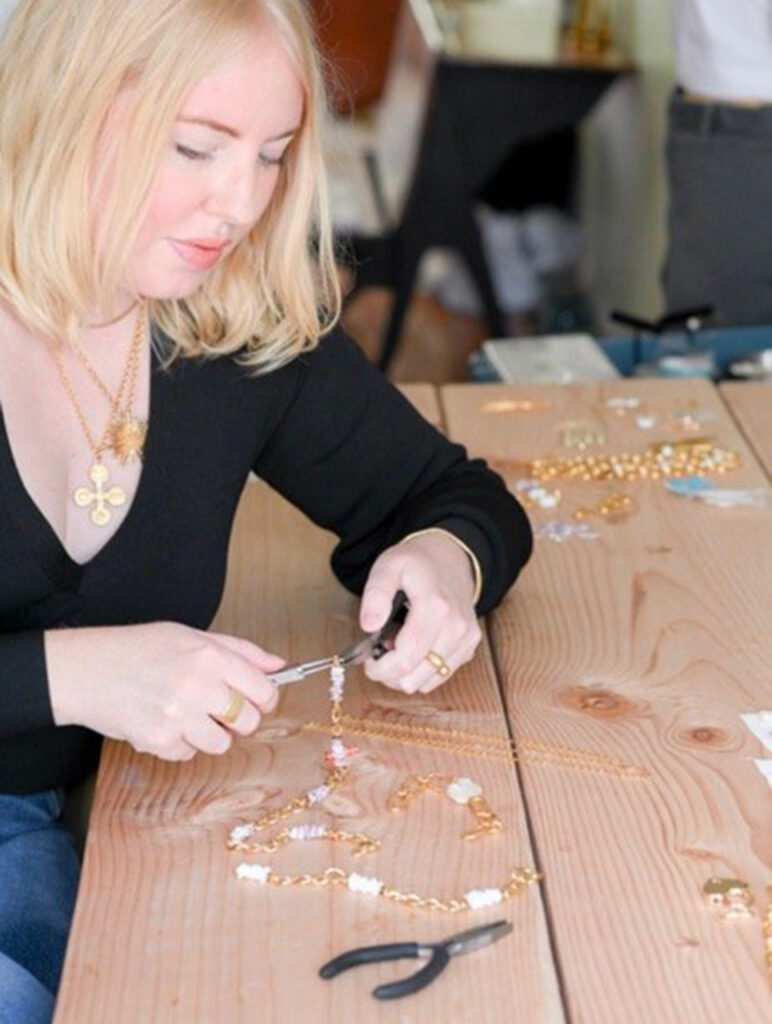For Christa Barfield, the entrance into agriculture was prompted by her exit from another industry.
Before the success of FarmerJawn—Barfield’s ambitious and sprawling enterprise that includes farming at the historic Elkins Estate, running a CSA, being part of a development project in East Kensington, opening a garden shop in Germantown, selling herbal-infused teas and providing education designed to prepare the next generation of Black and Brown farmers—Barfield was an overworked, undervalued mid-level healthcare administration professional working 16-hour days while trying to raise two kids. Being responsible for serving up to 200 patients a day left her burnt out and as she puts it, “unable to refresh myself emotionally, mentally and even physically.”
With no plan for future employment in place, she resigned from her job in 2018.
She decided to take two weeks for herself—away from the kids and away from her career search—to travel alone to the Caribbean island of Martinique, where she hoped to immerse herself in the French language and sit by the pool.
However, another avenue for self-care quickly emerged—maybe through coincidence, maybe through her subconscious need for deeper connection with her own wellbeing.
Growing food was central to each home-stay she booked.
The first spot was with a Thai chef who would greet her each morning with tea made from fresh garden herbs and finish each day with freshly-cut coconut for dessert, picked right from the tree in her yard. The next farm Barfield stayed on was called Petit Cocotier (translation: Little Coconut Tree), which is Black-owned. There, the sight of people who looked like her thriving off the land made a deep impression.
“I just felt drawn to it. Like they didn’t ask me to help them pack up boxes with freshly-picked herbs, fruits and vegetables … I just did it,” Barfield recalls.
Speaking about her experience, Barfield’s voice shifts—her words taking on an air of vibrant easiness, as if she’s being transported back to the tropical paradise.
“I was also getting the opportunity to watch their CSA members come and collect their shares,” Barfield says. “It was just so amazing.”
Upon her return she couldn’t shake the stark juxtaposition between what she witnessed on Petit Cocotier and “the discrimination that’s systemically built into the healthcare system, and how that applies to our food system.”
Growing up in Germantown, Barfield was acutely aware of how much she and her neighbors relied on the corner store, which was stocked with processed foods and lacked a variety of healthy options.
She was now inspired to do something about it. Although she never thought of herself as entrepreneurial, she set up a four-by-six-foot greenhouse in her backyard. Following the example of her Thai host in Martinique, she started growing herbs and founded Viva Leaf Tea Company (Grid #144, May 2021), in 2019.
She remembers the intense pressure she felt.
“I’m like, ‘Okay Christa, you just quit your job. You have two kids, you have a car, a house and you’re single. So you need to figure out how you’re going to maintain and sustain yourself,’” recalls Barfield.
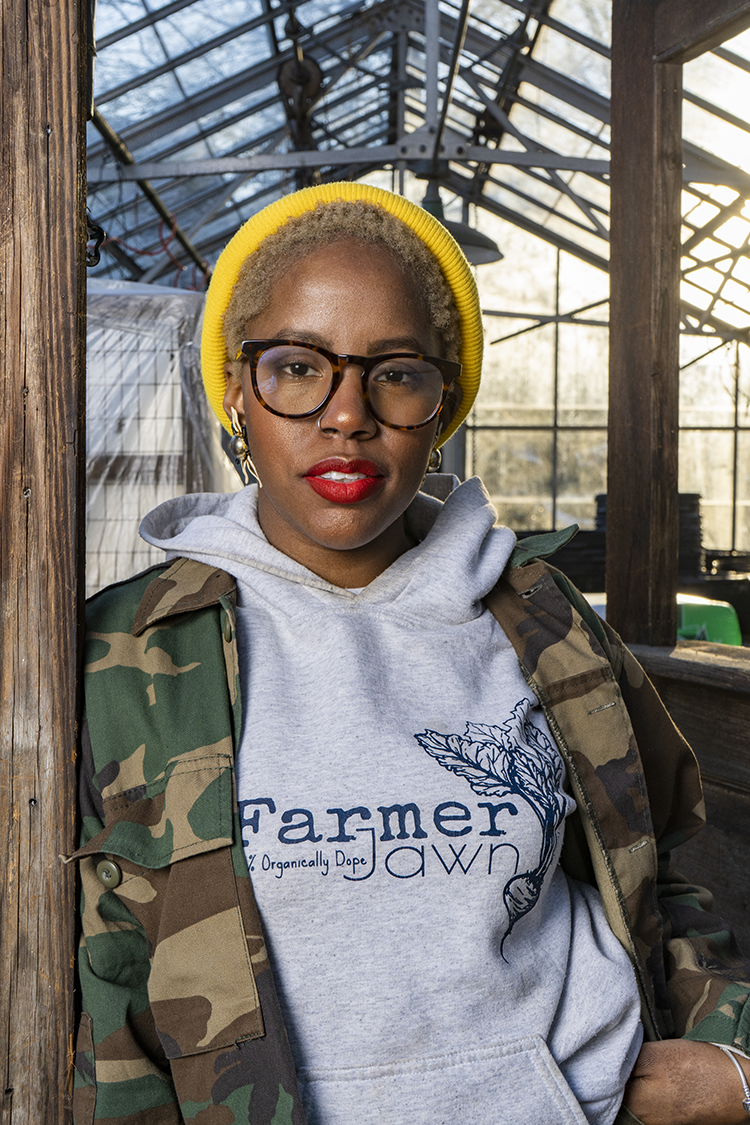
She began driving for Uber from 5 a.m. to 9 a.m. and then 5 p.m. to 9 p.m., giving herself a full 8 hours during the day to make sure her kids got to school and she could work in the greenhouse growing herbs for Viva Leaf.
While Viva Leaf was starting to pick up steam and gain customers, Barfield also realized that she wanted to take her daughter out of the local elementary school and homeschool her. On a mission to find enriching things for her daughter to do, Barfield went to the Schuylkill Center for Environmental Education where she encountered the center’s community garden.
Barfield jumped at the opportunity to join the garden and grow herbs on a 3,000 square-foot plot, while giving her daughter a nature experience at the same time. While Barfield started out with herbs, she realized that the community garden space presented an opportunity for her to grow other fruits and vegetables. And drawing on her experience at Petit Cocotier, she soon grew enough produce for Viva Leaf as well as a 10-member CSA, which she branded FarmerJawn in 2019.
My main goal is to make sure that we make it so that kids say, ‘I’m gonna be a farmer when I grow up because …you can sustain your family, and make really good money.’”
— Christa Barfield, FarmerJawn founder
After a favorable early 2020 write-up about Viva Leaf in the Philadelphia Inquirer, Barfield experienced yet another unexpected turn in March 2020 when she received a call from a developer. He had just read the story and had access to eight greenhouses on a large property in Elkins Park. At first, the magnitude of the move and unfamiliarity with the developer caused Barfield to say, ‘Thanks, but no thanks.’ But after a bit, she found the entrepreneurial urge to explore. Barfield accepted.
By April 2020, she had gone from a 3,000 square-foot growing space at the Schuylkill Center to 40,000 square-feet of greenhouse space—nearly an acre. Making the most of the opportunity, Barfield went to work expanding FarmerJawn’s CSA to 60 members and increasing Viva Leaf’s production.
Despite the pandemic, FarmerJawn had a good growing season. Its production and community engagement were growing.
Then, obstacles began to appear. The first was the inconsistent, and sometimes total, lack of heat in the greenhouse during the winter of 2021. Then came the burst pipes. And then came word from the developer that the entire property could be going up for sale.
By April 2021, with plants already thriving in the greenhouse, this possibility became reality and FarmerJawn had to move out. One of her last acts before leaving, aside from quickly salvaging what was left of her plants, was to paint over the FarmerJawn logo on the side of one of the buildings. The move was symbolic for Barfield.
“It was me, leaving [the space] on my own will,” she says, “and it not being snatched away for me.”
Distraught but not defeated, Barfield quickly started working on her next move.
First, she returned to the Schuylkill Center and put her crops back in the ground to maintain food production. She had an idea to create a micro-farming operation where she would work through community connections in Philly and beyond to set up a network of small-scale fully-equipped urban farms that would collectively produce enough vegetables for a centralized CSA. At the same time, she was questioning if FarmerJawn should even be doing farming at all. What if it could instead be a knowledge hub that would train a whole new generation of primarily Black and Brown farmers?
“Sustainability and profitability are key to FarmerJawn, which is also especially important for Black and Brown people that are stigmatized and bruised in a sense by farming because of how it has existed in our past,” she explains. “But farming is a part of our heritage.”
What Barfield landed on for the 2021 season was to grow as much from her Schuylkill Center plot as possible and source produce from other local farms. Remarkably, she was not only able to maintain her 2020 CSA members, but also grew the business. Her CSA membership grew to 70 members.
Unbeknownst to Barfield, as all this was going on, two FarmerJawn volunteers, Karen Shaffran and her son Zachariah Gharrafi, were looking out for her vision.
Shaffran teaches an environmental science project-based curriculum to cohorts of 11th and 12th graders at Cheltenham High School. She first connected with FarmerJawn as an internship opportunity for her Spring 2020 cohort. But Shaffran explains that when she was young, even though she didn’t grow up on or even near farms, she wanted to be a farmer. Her son, Gharrafi, who is majoring in environmental engineering at Columbia University, also shares her love of farming and volunteering at FarmerJawn.
While going on “Covid walks” during the spring and summer of 2021, they came across the Elkins Estate, which formerly served as a 42-acre retreat for Dominican nuns.
Shaffran remembered the estate from her youth and swore that there were greenhouses on the property, and sure enough there were. Upon further investigation, Shaffran learned that Landmark Developers had proposed developing the site into a high-end event space. But due to the pandemic, these plans had been put on hold.
Shaffran saw an opportunity.
After a few months of what Shaffran called “nibbles,” she and Gharrafi were finally able to get the right people on the phone and work out a tentative deal with Landmark to utilize a few acres of the land and its greenhouse space. After what happened to Barfield at the previous space, Shaffran didn’t want to create false hope, so she kept her exploration between her and her son. But when the deal looked good to go, the mother-son pair drove Barfield to the property, explained the situation and asked her what she thought.
Barfield quickly ran with it, worked out a formal arrangement with Landmark and re-established FarmerJawn on the property as an integrated urban farming operation utilizing about 5 acres of the 42-acre estate, with two greenhouses and 3.5 acres of outdoor vegetable and fruit production that supply produce for a 75-member CSA.
Barfield then joined forces with Brandon Ritter, bringing the longtime FarmerJawn volunteer on to establish a foundation, as well as serve as the chief operating officer.
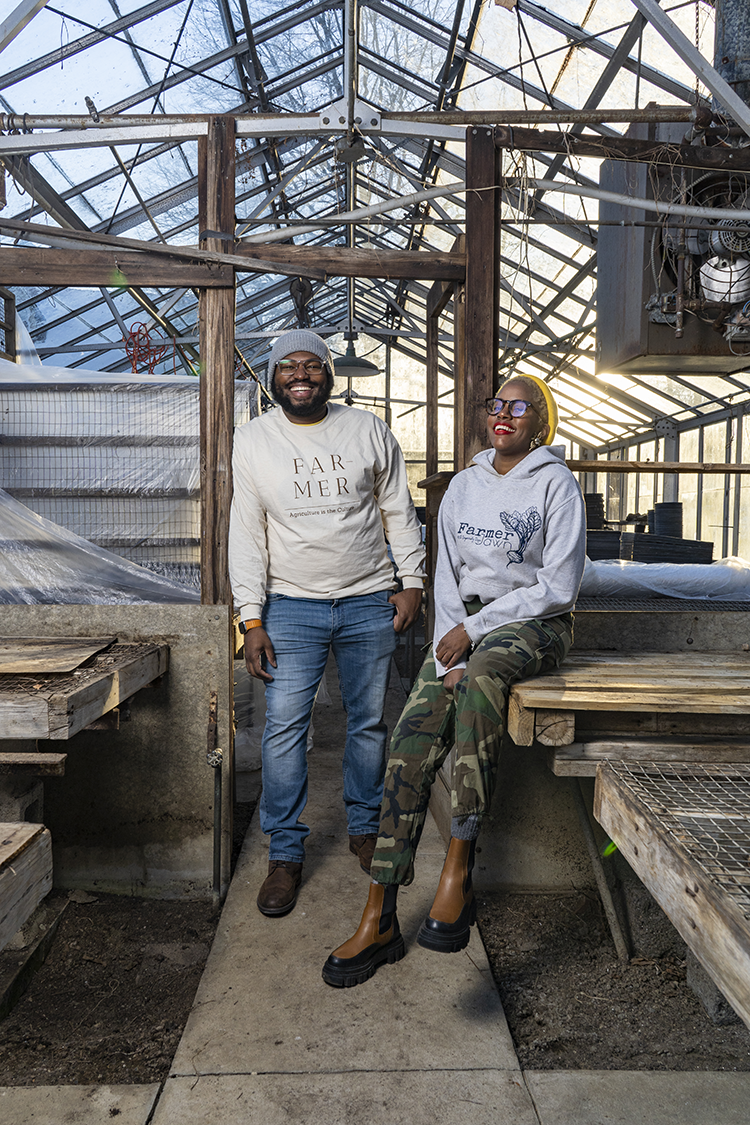
“One thing that’s important is that we’re doing things from the nonprofit side and the for-profit side,” Ritter explains.
The revenue-generating operations, like FarmerJawn’s CSA and Viva Leaf, fuel the for-profit operation. While the FarmerJawn Foundation arm raises money and makes partnerships to subsidize educational training opportunities for those who want to learn how to make a business out of urban farming, focusing on Black and Brown people in particular.
The model has certain advantages according to Ritter.
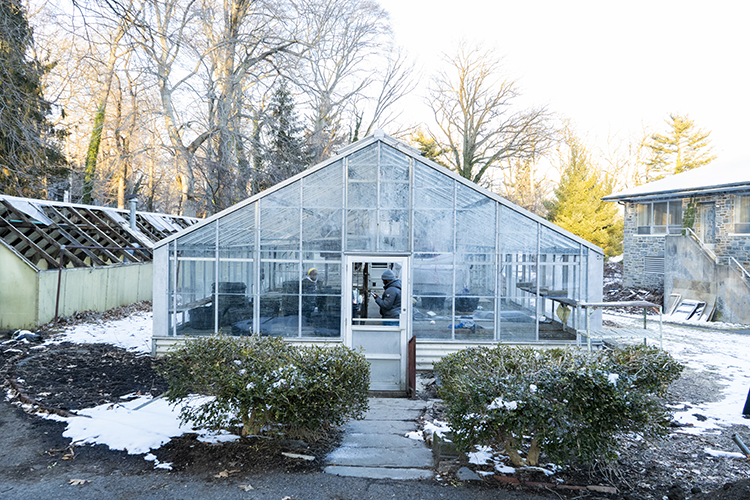
“If a person is learning with us at an urban educational level on the nonprofit side, we already have the necessary means to help them integrate into a for-profit,” Ritter says. “Or even start their own for-profit business, because we can demonstrate that it’s already been done and that we’re able to make it a sustainable and profitable venture.”
The foundation has already been working with Cheltenham High School to promote agricultural career paths and are actively training students like the ones in Shaffran’s class. On a recent winter day, Barfield taught Shaffran’s students how to tap sugar maple trees for maple syrup.
FarmerJawn plans to build off such educational experiences to develop a fully-
fledged agricultural school program in 2022, hoping to launch in 2023.
Barfield and Ritter say they have every reason to believe that their model can not only exist in a post-Covid world, but thrive, while righting some of the historic inequities that have made farming such a challenging occupation, especially for Black and Brown people.
[Barfield is] trying to answer what is the intersection of affordable food and a living wage for a farmer, because historically those two things don’t meet up.”
— Amanda Staples, founder of the Germantown Kitchen Garden
The sustainability and profitability FarmerJawn aims for can be hard to find in the agriculture industry.
A 2021 report from the Pennsylvania Association for Sustainable Agriculture (PASA) found that many direct-to-market farmers in Pennsylvania barely make enough money to live.
“Participating farms had a median net income of $18,500, which approximates the 2020 poverty rate in Pennsylvania for a two-person household,” the report found, noting that the farms involved included dairy, row crop and wholesale vegetable operations.
“While all farmers want to operate profitable, self-sustaining businesses, the financial benchmarks identified by our study are consistent with industry structural challenges that negatively impact small- and medium-scale farms,” the report continues. “Creating and expanding public and private programs and partnerships will be necessary to help direct-market vegetable farmers continue their essential work providing fresh, nutritious food for their communities.”
As one of the few small-scale urban farmers in the area who has been able to make a living, Amanda Staples has high hopes for Barfield.
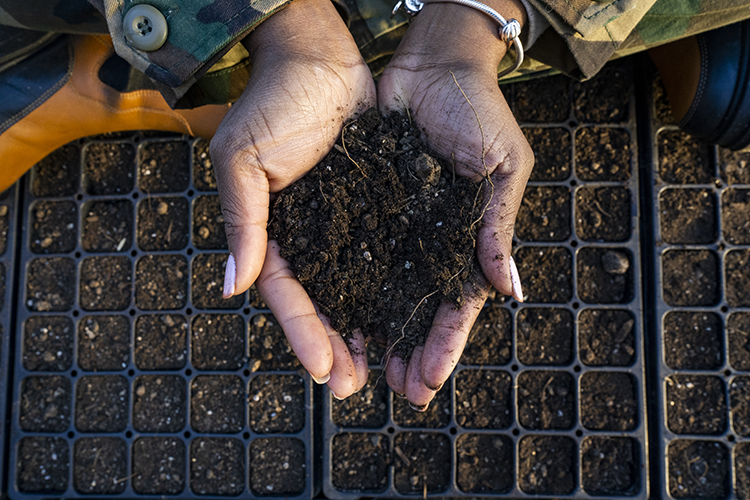
“[Barfield is] trying to answer what is the intersection of affordable food and a living wage for a farmer, because historically those two things don’t meet up,” says Staples, who founded the Germantown Kitchen Garden in 2008 with her then-partner.
Still at it more than a decade later, Staples is living proof that Barfield and Ritter’s vision is achievable. Staples bought her one-acre property at a time when the demand for local food was resurging in the media and programs like the Pennsylvania Horticultural Society’s City Harvest, established in 2005, were providing necessary materials as well as technical and community support for growers in Philadelphia.
But even with this support and demand, a big question at the time was if it would be possible to actually make a living wage as an urban farmer. This is a question Staples has answered, although with some caveats.
“It’s been a challenge and a pleasure,” Staples explains. “I think that I’m a bit unique in that I don’t have children. If I had anything in my life that was different, I don’t know that I would be able to be doing what I’m doing. I’m not making a ton of money, but I am making a living and I’m not in debt.”
In 2015, after splitting up with her partner, she didn’t know if she could sustain the farm and ended up taking another job.
But urban farming is a lifestyle. She loves to be able to farm but, as she puts it, “also not live way far out in the country.” A lesson in winter wreath-making she’d taken with her grandmother when she was young came in handy. In 2016, she started creating wreaths to sell during the winter, which added a new revenue stream. She restarted the urban farming operation in 2016 and continues to earn winter wreath income along with the year-round income from her on-site farmer’s market—where the social capital of being at the center of her Germantown community is just as important as the financial capital.
When asked what she thinks of Barfields’s operations, she says, “It seems like she’s got a big voice and people are listening to her, so I’m really excited to see where that conversation goes.”
Judy Wicks, whose career building Philadelphia’s local food sector has left an impactful legacy, has similar sentiments on the potential of FarmerJawn ushering in a new generation of profitable and sustainable farmers. She thinks Christa is the person to do it.
“There is a magical quality to Christa, as though she is leading us into the world we all want to live in. One of abundance, goodness and joy,” Wicks says.
Wicks cites Barfield as a “creative entrepreneur” and “a powerful force for change.”
“While participating in her events, I have witnessed her as a dynamic, articulate and caring leader, with contagious enthusiasm, who builds community and brings hope, encouraging others to make a difference, while enjoying life,” Wicks says.
Barfield and Ritter are taking that conversation to a new level with their most recent venture in East Kensington. They have partnered with the owners of the Comly Commons on the 1800 block of East Boston Street to integrate urban agriculture into the building’s conversion plan. The space is set to be developed into apartments with ground-floor commercial spaces. FarmerJawn’s vision would add a 2,500 square-foot indoor growing space in the complex where the organization can produce herbs and edible flowers for Viva Leaf.
This location will also bring opportunities to expand their CSA to the 100-plus residents in the building, not to mention the broader River Wards and Kensington area.
Barfield and Ritter also said that the owner of the building is planning to make 6,000 square-feet of the building’s commercial space available to Black-owned businesses that FarmerJawn will help attract.
FarmerJawn envisions setting up Viva Leaf operations, which is currently online only, in the commercial space, where they’ll sell teas, herbal wellness products and produce coming straight from the indoor farm, just a few floors above. They also envision inviting the community into the space to host their own events.
FarmerJawn is also opening a garden supply center at 6730 Germantown Avenue in Mount Airy (where Viva Leaf was once headquartered) in a building that Barfield already owns. There, local gardeners will be able to buy materials and gain the resources and knowledge they need to grow food at home. The shop will host a grand opening during Earth Week in April 2022.
Opening up these new sites in East Kensington and Germantown will not only revive Barfield’s vision of decentralized farming sites throughout the city, but it also dramatically expands access for the new farmers that FarmerJawn is training.
In Barfield’s mind, this is how you grow business opportunities and make farming sustainable for growers, so that more people become interested in growing food for a living.
“Farming is just dope,” Barfield says. “My main goal is to make sure that we make it so that kids say, ‘I’m gonna be a farmer when I grow up because it’s a way that you can sustain your family, and make really good money.’”


